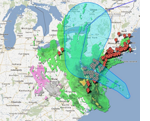 Homeowners who have experienced flood damage are advised to take important safety precautions with regard to their home’s heating and cooling systems, including gas logs and gas fireplaces. Damage from standing water may not be apparent, but can put families at risk if not addressed properly. All of our installation manuals warn “Do not use this appliance if any part has been under water. Immediately call a qualified service technician to inspect the appliance and to replace any part of the control system and any gas control which has been under water.” We advise homeowners to play it safe and replace, rather than repair, flood-damaged heating, cooling, and water heating equipment.
Homeowners who have experienced flood damage are advised to take important safety precautions with regard to their home’s heating and cooling systems, including gas logs and gas fireplaces. Damage from standing water may not be apparent, but can put families at risk if not addressed properly. All of our installation manuals warn “Do not use this appliance if any part has been under water. Immediately call a qualified service technician to inspect the appliance and to replace any part of the control system and any gas control which has been under water.” We advise homeowners to play it safe and replace, rather than repair, flood-damaged heating, cooling, and water heating equipment.
Corrosion begins inside the valves and controls, and damage may not be apparent, even if the outside of the device is clean and dry. At a minimum, this damage can result in reliability problems. In every case, contractors must replace all valves and controls that have been in contact with flood water. The gas pressure regulator on a propane system should also be checked. This regulator contains a small vent hole to sense outside pressure. For effective gas pressure regulation, this hole must always remain unobstructed. During a flood, debris can easily plug the hole, causing dangerous malfunction or corrosion.
Once again, we recommend the prudent course of replacing flood-damaged heating, cooling and water heating equipment. The cost will be, in the long term, less expensive than “band-aid” repairs. Safety first!
